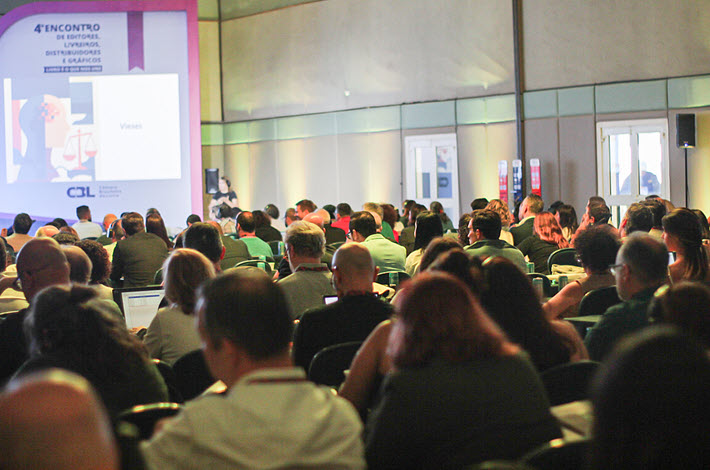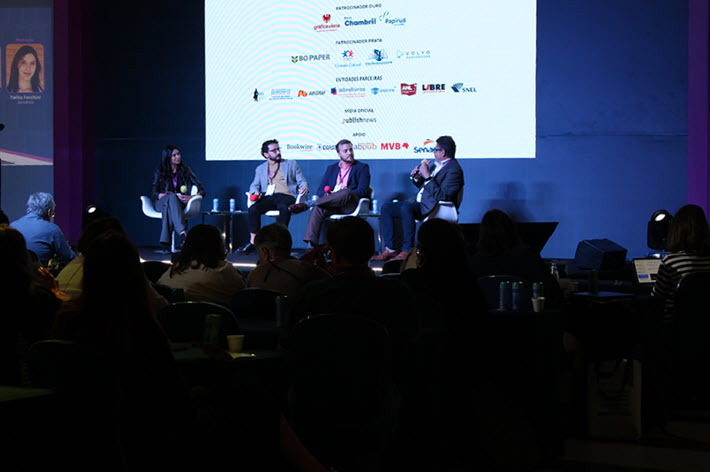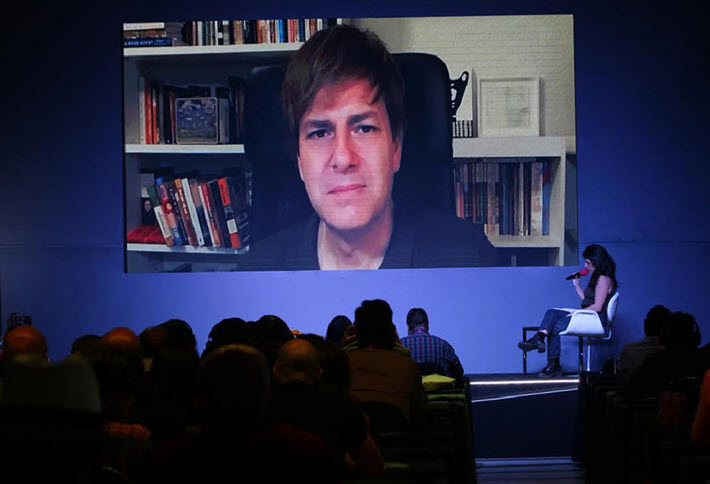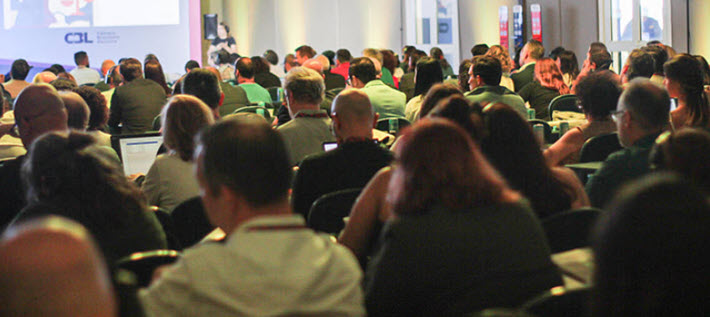
Brazil’s 2025 Encontro de Editores, Livreiros, Distribuidores e Gráficos, the Meeting of Publishers, Booksellers, Distributors, and Printers, seated at Guarujá in late August. Image: Publishing Perspectives, Talita Facchini
ith the premise that a developing market needs all its players on the same page, the
, the Brazilian Book Chamber (CBL), on August 20, 21, and 22 held its fourth edition of the
the Meeting of Publishers, Booksellers, Distributors, and Printers (EELDG)—in the coastal town of Guarujá near São Paulo.
 Curated by Cassia Carrenho and Fabio Uehara, the program welcomed more than 300 professionals from the publishing sector, including marketing people, technology specialists, and authors. They spent three days in a hotel conference center to hear panels on topics including book consumption; the legal issues and advances of artificial intelligence; environmental, social, and governance policies; curation; marketing; and organizational culture.
Curated by Cassia Carrenho and Fabio Uehara, the program welcomed more than 300 professionals from the publishing sector, including marketing people, technology specialists, and authors. They spent three days in a hotel conference center to hear panels on topics including book consumption; the legal issues and advances of artificial intelligence; environmental, social, and governance policies; curation; marketing; and organizational culture.
Publishing Perspectives readers may recall that one of the main issues for Brazilian publishing industry players s is the approval of the so-called Cortez Law, which would cap discounts on new titles at 10 percent during their first 12 months on sale. The all-industry event at Guarujá saw a quick update on the subject: The bill, conference-goers were told, still needs to be put to a vote in the Brazilian plenary.
“We’re fairly confident that the law will pass, and everyone is optimistic,” said Marcus Teles, owner of the LivrariaLeitura bookstore chain, which has more than 100 stores in Brazil.
Teles, who is also vice-president of the Brazilian Booksellers Association (ANL), urged the industry to start putting the bill’s premise into practice now. “What we want is more competition,” he said, “more physical bookstores, and I believe the market as a whole understands this.”
Artificial Intelligence and the Protection of Copyright

At the Meeting of Publishers, Booksellers, Distributors, and Printers, seated at Guarujá in late August. Image: Publishing Perspectives, Talita Facchini
As expected, artificial intelligence was a recurring theme in the conference program. In addition to a session on the legal and licensing issues around AI, the Brazilian Association of Book Publishers (SNEL) updated the industry on ongoing discussions around regulation.
“Basically, the protection of copyright is the most important issue we are discussing with congress,” said Renato Fleischner, treasurer of SNEL. “We don’t have many updates, but it’s crucial that copyright and text remain at the center of these conversations.”
On the same topic, one of the international guests, Argentine consultant Daniel Benchimol of Proyecto451, gave a lecture on AI and its impact on the book industry. Citing a recent report by CERLALC, the Regional Center for the Promotion of Books in Latin America and the Caribbean, he highlighted the lack of significant investment by publishing companies in training their staffers in AI.
In contrast to the billions spent in some countries, Benchimol said, “There are already advanced technologies that cannot be widely deployed simply because there’s no infrastructure for people to use them.” His message: the industry must remain alert and up to date.
‘Donating as Much as Possible Back to Bookstores’

Bookshop.org’s Andy Hunter speaks to Brazil’s Meeting of Publishers, Booksellers, Distributors, and Printers in August. Image: Publishing Perspectives, Talita Facchini
Another international guest was Andy Hunter, CEO of Bookshop.org, spoke by video to the program. Bookshop.org reportedly has already generated more than US$40 million for independent bookstores in the United States, and it’s widely admired by Brazilian booksellers.
In a conversation moderated by journalist and editor Raquel Cozer, Hunter reiterated the potential of a collective bookstore marketplace.
“On average,” he said, “those [booksellers] that use the site regularly earn between US$30,000 and US$50,000 per year, but the most active stores can earn up to US$100,000. One bookstore has already made US$2 million on the platform,” he said. The site’s revenue outlook for this year is US$75 million.
“About half of our sales are direct and half are through bookstores,” Hunter said. “This balance allows us to pay our bills—and we don’t usually have many—while donating as much as possible back to bookstores.”
He said that Bookshop.org has already taken 2 percent of Amazon’s market share.
“When we started,” he said, “my dream was 1 percent. Now we’re at 2 percent, which is incredible, and my next goal is 5 percent,” he said. “Sometimes people ask, ‘Do you want to destroy Amazon?’ And I say, ‘No, we won’t destroy Amazon at all.’ But honestly, 5 percent of Amazon’s book sales is an enormous amount of money—enough to make a big difference for local bookstores.”
Among many other highlights, Nielsen BookData combined results from its three surveys covering the Brazilian book industry—consumption, production, and sales—to offer several new insights.
Although Brazil is still considered a developing market, particularly in the audiobook format, the country has stood out for the quality of data collected and shared findings across the industry, as is common among some more mature markets.
At Frankfurter Buchmesse (October 15 to 19) , you’ll find the Brazilian Book Chamber in Hall 5, at Stand A149.
More from Publishing Perspectives on the Brazilian book publishing industry is here, more on publishing conferences in various parts of the world is here, more on Frankfurter Buchmesse is here.
Wherever our international readers are in the world, they use our free daily email to be sure they don’t miss a story. Sign up now.
